Edin Terzic’s side have endured a miserable domestic season, but are one win one from crowning an unforgettable European campaign
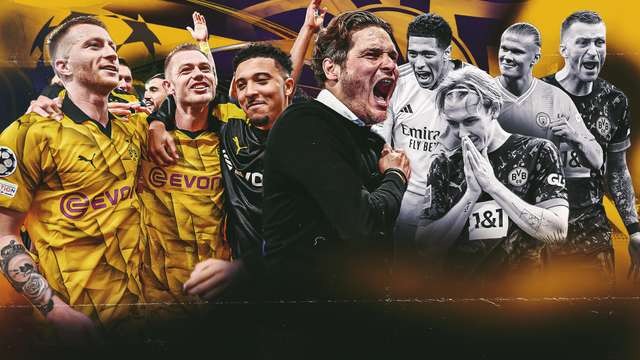
This wasn’t supposed to happen. When Jude Bellingham applauded the famous Yellow Wall for the final time in May 2023, clapping the thousands of fans before him with teary eyes, there the sense of something ending in Dortmund. The midfielder had been central to a revival that fell narrowly short of its lofty goals, as Edin Terzic’s fell agonisingly short in a Bundesliga title race they felt destined to win.
Bellingham knew, by then, that he would be playing in Real Madrid white soon enough. Any hopes of ending Bayern Munich’s 11-year-long vice-like grip on German football had been dashed.
And while the Black and Yellow did little domestically this season to change their fortunes, they have worked wonders on the continent. This side, void of Bellingham and still reeling from the loss of Erling Haaland, is on the cusp of doing something their iconic team of the early 2010s could never accomplish: win a Champions League final.
It’s an unlikely twist, especially given the loss of such important players and a turbulent Bundesliga campaign. Still, this has hardly been a run of luck. Rather, Dortmund have choreographed their way through Europe, piecing together the kind of miraculous run that could live among the competition’s best.
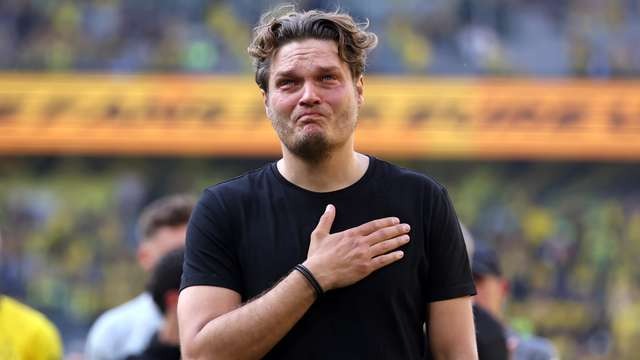
Title heartbreak
In early 2023, Dortmund were in fine form. Bellingham had gone from promising prospect to the best player in the Bundesliga, and while he wasn’t part of a dominant side, Terzic had the team playing like potential champions.
And then, the wheels fell off. It started, arguably, with a Champions League loss to a miserable Chelsea side. Dortmund lost at Stamford Bridge – Bellingham missing a crucial chance – to crash out of the competition in the last 16.
Soon, the goals dried up, and the defensive mistakes multiplied. They were thrashed by Bayern, and a Bellingham knee injury left them void of their talisman in central midfield for the final weeks of the campaign. And so while on paper, their failure to beat Mainz at home on the final day of the season with the title in their hands was a miserable result, on form, it wasn’t all that surprising.
Still, the defining image of the season was that of a despondent Terzic – a boyhood Dortmund fan – apologising to his supporters after throwing away the title.
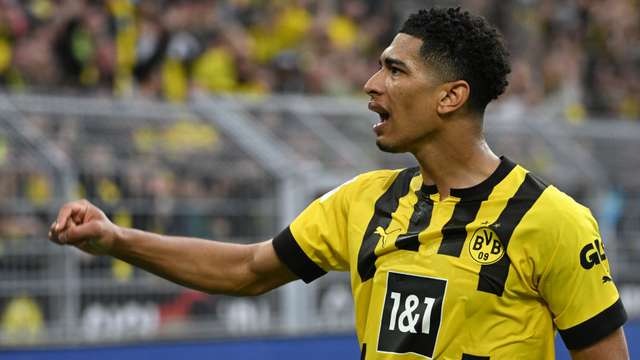
Moving on
And there were few signs that things would improve in 2023-24. It had been accepted for some time that Bellingham would leave the club at the end of the campain, and behind the scenes, the English midfielder was nearing a deal to join Real Madrid.
In public, though, things were in a state of chaos. Different rumours cropped up every week, with Liverpool also coveting Bellingham’s signature. The Dortmund hierarchy, too, pledged to do everything to keep their star man – only further fuelling the media firestorm. Bellingham handled it all admirably, turning in his best season in a Dortmund shirt and winning the Bundesliga’s Player of the Season award. But there could be no doubts that his pending departure was a distraction.
Liverpool eventually pulled out of the race in April, leaving Madrid with a clear run at their man, and it was all sorted relatively soon after the season ended. Bellingham got to say his goodbyes at Signal Iduna Park – albeit in dire circumstances – but there were few doubts about his future. It left Dortmund with €103 million to spend, and one of the world’s best midfielders to replace.
More broadly, though, Bellingham’s departure represented the end of something. Dortmund have always been good at buying talent, moulding it, and selling big, but they always seemed to have a star in their ranks. Before Bellingham there was Haaland, and before him, there was Jadon Sancho and Ousmane Dembele. The post-Bellingham iiteration of Dortmund, though, had no obvious talisman in the making to rely upon.
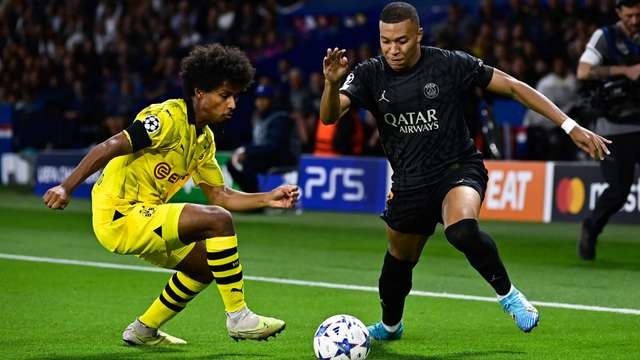
Rotten start
Their lack of quality was apparent early on in 2023-24, as Dortmund fell out of the Bundesliga title race before it ever really started. Bayern Munich, buoyed by the arrival Harry Kane, were a much improved outfit – at least in the early months of the season. But the real challengers were Xabi Alonso’s Bayer Leverkusen, who would go on to complete an undefeated league campaign.
Dortmund, meanwhile, stalled. They drew against Bochum and Heidenheim, and looked far from convincing in early wins over Koln and Freiburg.
Their Champions League campaign, meanwhile, got off to a miserable start having been drawn into the ‘Group of Death’ alongside Paris Saint-Germain, AC Milan and Newcastle. Terzic’s side tried to park the bus at Parc des Princes, but left Paris with a 2-0 loss and just one shot on target. They performed little better in the 0-0 home draw with Milan next time out, either, and after two matchdays, Dortmund looked more likely to crash out of Europe altogether than make a run deep in the competition.
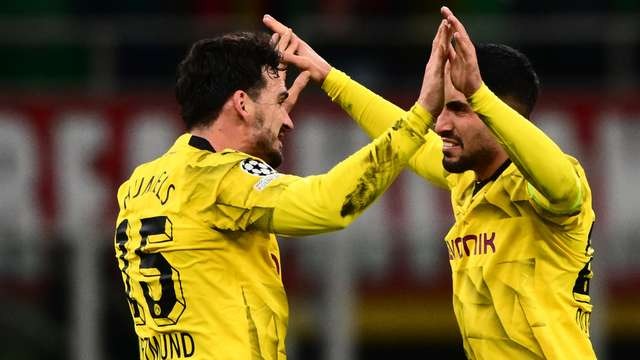
Turning points
Things didn’t ever improve domestically, and there was scattered talk in November in December that Terzic could lose his job after losses to Stuttgart in both the Bundesliga and DFB-Pokal. Mats Hummels revealed this week that he furiously lambasted his manager for Dortmund’s set-up in those fixtures, and the club reacted by hiring former midfielders Nuri Sahin and Sven Bender to join Terzic’s staff and try improve morale.
In Europe, though, things began to turn around. It started with a scrappy 1-0 win against Newcastle at St. James Park, as the German side rode their luck but still managed to snag three points to keep their qualification hopes alive.
They repeated that feat at home two weeks later, running out 2-0 winners as Eddie Howe’s injury-ravaged Magpies struggled to create in front of a raucous Yellow Wall. Their hopes of winning the league may have already crumbled, but there was reason to believe that they could, at the very least, end up playing knockout football in Europe.
The big win, though, came on November 28. Three weeks after a 4-0 dismantling by Bayern Munich, and two after the first dire loss to Stuttgart, Dortmund put three past Milan at San Siro to secure their place in the last 16. A redemptive 1-1 draw with PSG on December 13 then ensured they would enter the knockouts as a group winner, ensuring they avoided many of the favourites for the competition.
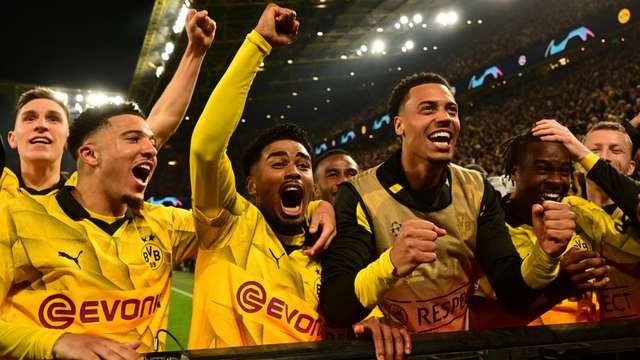
Continued improvements
Dortmund didn’t spend the Bellingham money particularly effectively. Felix Nmecha, brought in from Wolfsburg, was their biggest summer investment, but he was lambasted by fans for offensive social media posts that emerged upon his arrival, and picked up an injury that stalled his season before it could truly start.
But their winter business was far more shrewd, as in one of the surprise moves of the January window, Dortmund brought back Sancho on loan, capitalising on Manchester United’s shunning of the England winger to negotiate the return of their former talisman.
In Europe, meanwhile, they went about knockout football with aplomb. Their last-16 opponents, PSV, seemed a tricky match-up. Led by a revitalised Luuk de Jong, the Dutch side were running away with the Eredivisie title, a first-leg 1-1 draw – marked by one of Hummels’ worst performances of the season – didn’t inspire confidence. But Dortmund were dominant in the second, and comfortably saw off the Peter Bosz’s side to the tune of a 2-0 win – Sancho grabbing the opening goal inside three minutes.
In thw quarter-finals, Atletico Madrid were always going to be a more significant challenge. Although not the same terrifying defensive unit of old, Diego Simeone’s side remain experts when it comes to knockout football. And after 30 minutes of the first leg, it seemed that Dortmund’s season could be coming to a premature close. Los Rojiblancos went 2-0 up before half-time, and were cruising, but a late Sebastian Haller goal saw Dortmund leave the Metropolitano with a narrow deficit.
Signal Iduna Park then worked its magic for the second leg as Terzic’s side scored four times, and limited Atleti to just three shots on goal in an inspired performance to set up a semi-final reunion with PSG.
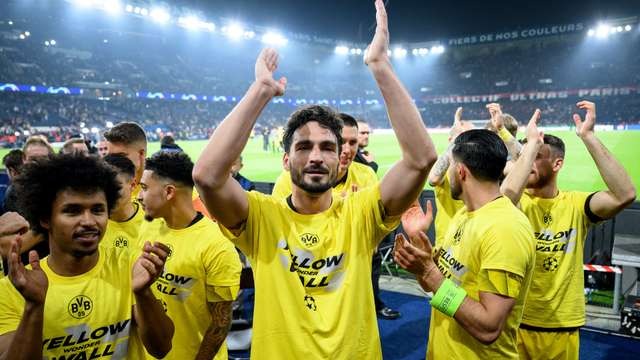
‘Possible to play better’
The first leg of the semi was tense, but Dortmund won the tactical battle. Terzic pieced together a fine plan, ensuring that his side would funnel the ball away from Kylian Mbappe on the left-wing, and giving Sancho licence to wreak havoc on the right. Mbappe was kept quiet, Sancho completed the most take-ons in Champions League history, and a simple long-ball to Niclas Fullkrug – and ensuing cool finish – gave Dortmund a 1-0 lead to take to France
Still, there was a sense that a trip to Parc des Princes – a ground where Dortmund were handily beaten in September – would be far more difficult. Terzic admitted as much in a pre-match press conference.
“At that time, we weren’t yet a cohesive unit and we tried adopting a defensive approach. The plan seemed good, but its application didn’t satisfy me. We lacked courage, but we showed last week in Dortmund that it was possible to play better in a completely different style,” he said.
His words roused a significant response out of his team. Dortmund weren’t exactly the aggressor on the night, but they didn’t shy away from the fight either. A 4-2-3-1 setup, complete with dynamic attacking play, carried them to a 1-0 win.
Hummels came away as hero on the night, scoring from a corner and turning in a match-winning defensive performance at the back. Luis Enrique’s men could feel disgruntled for routinely smashing the ball against the woodwork, but Dortmund deserved their win.
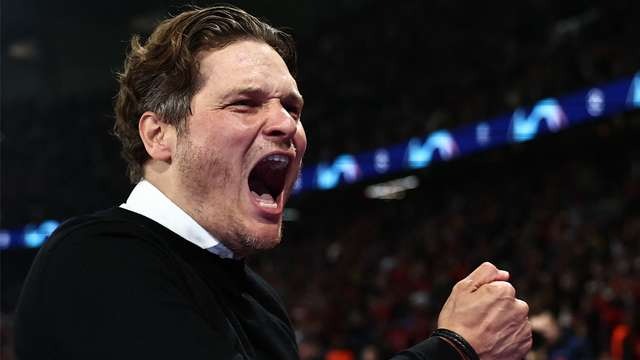
Cusp of glory
And so we end up at Wembley again. The last time Dortmund played under the arch in a Champions League final, things didn’t go well, as Jurgen Klopp’s well-oiled machine were undone by a late Bayern Munich goal to lose 2-1 in 2013.
That night, they were slight underdogs; on Saturday, they are dreamers. This is an excellent Real Madrid team, complete with the Ballon d’Or front-runners Vinicius Jr and Bellingham, a revitalised Toni Kroos, and a manager in Carlo Ancelotti who makes a living off coaching his way through games of this magnitude.
But there’s a sense of resilience about this Dortmund that was absent last year. They started the season in miserable fashion, but have steadily improved. They showed against PSV that they can handle a lesser opponent, proved against Atletico that they can better an equal, and asserted against PSG that they can punch above their weight.
This game is certainly a step up again, though. Those three knockout wins were impressive in their own right, but Madrid will require a giant-killing of the magnitude we have not yet seen this team pull off. France legend Thierry Henry summarised it best in a press conference earlier this week, joking that Dortmund would need to “pray” if they are to beat this Madrid side.
Dortmund have, to their credit, managed to negotiate every challenge the Champions League has thrown at them so far – and overcome expectations time and time-again. Silverware may seem unlikely, but Terzic has shown that he can coach this team to a victory. For all their faults, it would be foolish to rule Dortmund out of performing a miracle.
